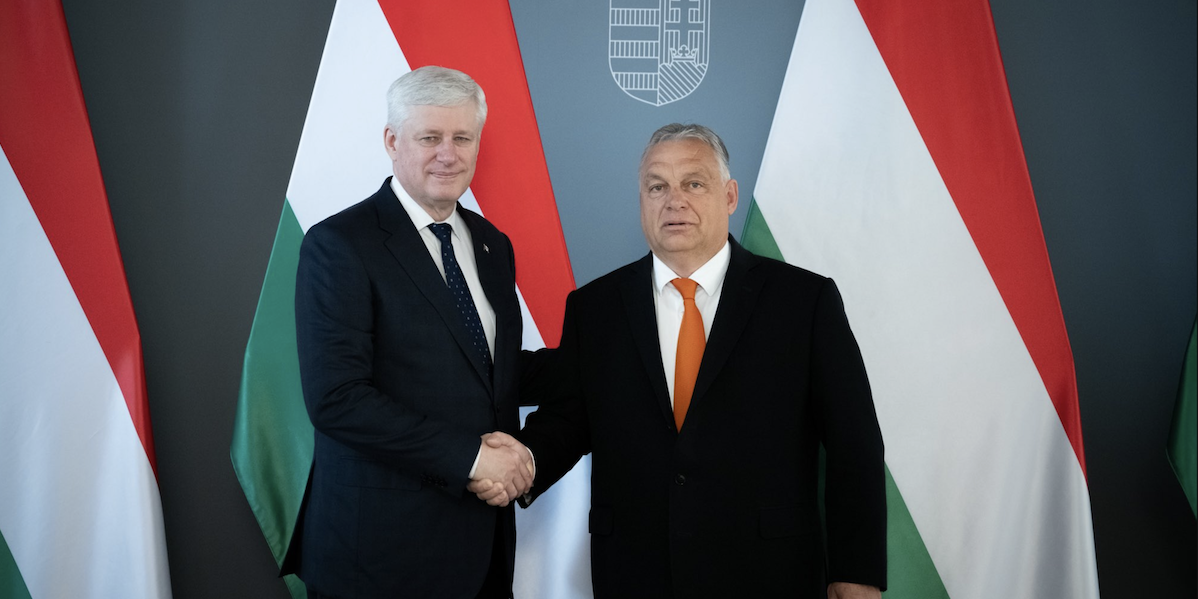Stephen Harper is having a bit of a moment lately, thanks to his instantly notorious selfie last week with Hungarian neofascist Viktor Orbán, which both of them proudly tweeted about.
Orbán is the prime minister of Hungary and leader of the increasingly far-right Fidesz political movement, which advocates a “national conservative” ideology. He has been accused of dismantling Hungarian democracy and using racist rhetoric in his quest to turn Hungary into an “illiberal democracy.”
Perhaps Harper was there to try to get Orbán on side in the unhappy matter of Ukraine, Russia, NATO, and the Hungarian premier’s stubborn tendency to see things Vladimir Putin’s way in that conflict. Harper’s tweet certainly suggests so.
The International Democratic Union
Harper is the former Conservative prime minister of Canada and is now chair of the so-called International Democrat Union (IDU), the organization of right-wing and even-farther-right-wing national political parties that serves as the Neoliberal Internationale in this era of faltering democracy.
Together, judging from their harmonic tweetery last Thursday, the IDU is also an exclusive mutual admiration society – although not one without its differences.
Orbán tweeted first (in English) about his “great meeting” with Harper. “International cooperation between right-wing, conservative parties is more important than ever. Chairman Harper is a great ally in this respect. Thank you for your support, Mr. Chairman!”
Harper followed up a couple of hours later: “I was pleased to meet with Fidesz Party Leader @PM_ViktorOrban today in Budapest. We discussed the IDU’s strong support for Ukraine and the importance of centre-right parties strengthening their collaboration.”
Calling Fidesz a centre-right party is genuinely Orwellian. The same could be said more convincingly nowadays about the Conservative Party of Canada, which Harper helped to found. Though I suppose the stubbornly small-L-liberal preferences of large Canadian voter blocks are it holding back a little from achieving Harper’s ambitions.
As for the term “collaboration,” that’s a fair description of how IDU governments seem to try to work together to defeat more progressive parties in other countries – an activity that never seems to be called foreign interference by Canadian media, for mysterious reasons. Harper may not have been aware that use of the term “collaboration” is fraught in Europe in ways it isn’t necessarily in North America. It’s something to do with what happened over there in the 1940s.
Harper’s legacy
Back in Canada, Conservatives grow misty eyed when they think of Harper – after all, he was their last leader proven capable of winning a federal election — they’ve actually had five leaders since Harper was beaten by Prime Minister Justin Trudeau’s Liberals in 2015, although two were short-term placeholders. The two that led the party into elections with Trudeau both lost. The jury is still out on the latest one, Pierre Poilievre.
Other Canadians, naturally, have a less enthusiastic assessment of Harper’s achievements in office than do his CPC followers.
“Stephen Harper and his Conservatives have racked up dozens of serious abuses of power since forming government in 2006,” wrote Tyee publisher David Beers shortly before the 2015 election. “From scams to smears, monkey-wrenching opponents to intimidating public servants like an Orwellian gorilla, some offenses are criminal, others just offend human decency.”
The article listed 31 instances of broken laws and ethical lapses during Harper’s nearly 10 years in power. A couple of days later, The Tyee published 28 more ways Harper’s Conservatives “lied, flouted rules and stymied democracy to achieve political and ideological ends.”
So, in regard to their approach to the mechanics of democracy at least, Harper and Orbán would appear to be birds of a feather, flocking together.
A troubling collaboration
But say what you will about Orbán. He is popular with Hungarian voters. He won a supermajority in 2010 that has allowed him to attack immigrants, interfere with the courts, reject European Union efforts to support multiculturalism, and undermine Hungarian democracy, among other sins.
Blogger Susan Wright asserted in a piece on this pairing, that “the CPC is frantically looking for the secret sauce to catapult the party back into power and keep it there.” And so far, she observed, nothing is working.
The party, she suggests, may be looking at Orbán’s brand of East European populism as a model. She asks: “Where might collaboration between the CPC and the likes of Orbán lead us?”
One shudders to think!
Like Harper, the latest Conservative leader is not above circumventing the rules of how to conduct and finance a fair election.
Harper, it would seem, haunts us still.



